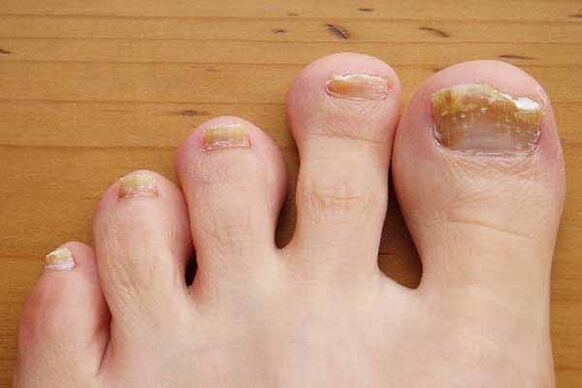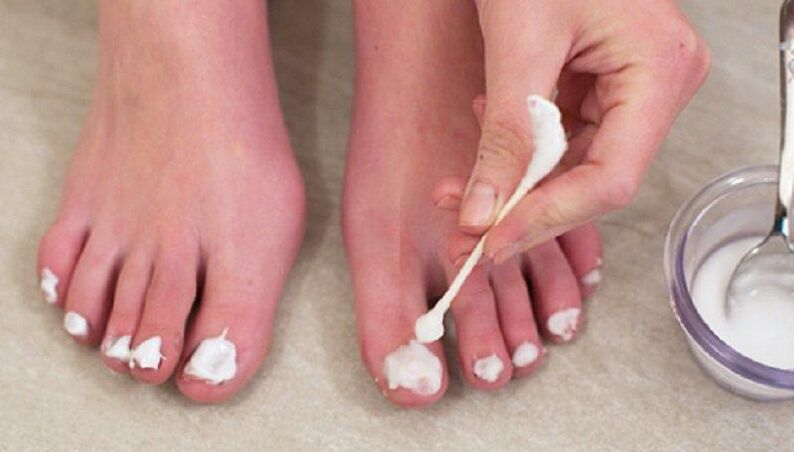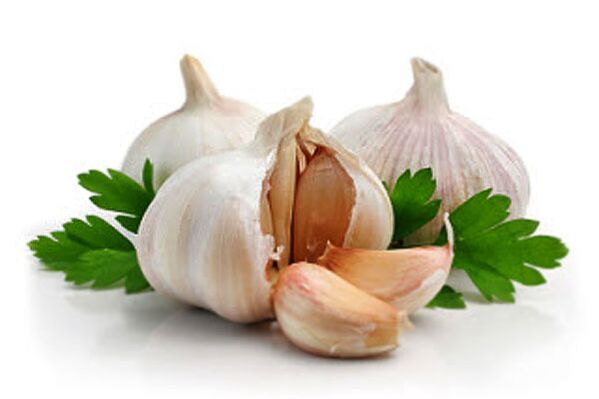
Healthy skin and healthy nails are a source of pride for every person. But what if the infection has damaged her appearance? The answer is simple: destroy the infection! One of the causative agents of diseases that damage the outer skin is a fungus. Over the course of many centuries, people have learned to combat it using available natural remedies.
The fungus's preferred habitats on the human body are feet, fingers and toenails. The pathogen multiplies in a warm, moist, alkaline environment and is therefore rarely found on the hands. The infection is transmitted from person to person and often occurs in places such as baths, saunas and swimming pools. Another route of infection is through common objects (shoes, towels).
In medicine, skin fungus is called mycosis, and when the pathogen has settled on the nails, it is called onychomycosis. A fungal disease is not easy to cure. If the disease is not diagnosed early, it can take months of hard work to combat it. Any means are good for treating fungus - both medicines and folk recipes.
Nail fungus can be cured with folk remedies, provided that the root part of the nail (matrix) and the nail bed are not affected. Deep penetration of the fungus into the tissue requires treatment with systemic drugs.
Signs that indicate nail fungus:
- thickening and discoloration of the nail plate;
- looseness of the outer layer of the nail;
- brittleness and splitting of the nail;
- Redness, itching and burning of the nail fold;
- unpleasant smell from the nail.
If any of these symptoms occur on your nail, be sure to consult a doctor. A dermatologist or mycologist diagnoses and treats fungal diseases.
There is often discussion on forums about which folk remedies can cure nail fungus. People talk about successful ways to get rid of nail fungus or complain that this or that drug did not help.
The most effective means of combating fungus include:
- apple or table vinegar;
- celandine;
- Iodine;
- tea mushroom;
- garlic and onions;
- Coffee.
How to cure nail fungus quickly?

Timely and correctly selected treatment can help quickly get rid of nail fungus.
If you do not want drug treatment and opt for traditional medicine, be sure to consult your doctor.
Any of the traditional remedies may help one person but are useless to another.
Therefore, in order to treat onychomycosis quickly and effectively, diagnosis and consultation in a medical institution is necessary.
How to get rid of fungus on nails?
The causative agent of the disease can be destroyed or eradicated by external treatments: baths, compresses, applications. Fungi multiply in a moist, alkaline environment, and an acidic environment is harmful to them, so products such as vinegar and lemon are effective. Plants with strong bactericidal properties also fight fungi well.
Traditional treatment of toenail fungus: effective recipes
Vinegar. A universal remedy for the treatment of fungus, even if it affects more than half of the nail. You can use both table vinegar and apple cider vinegar. If the nail plate is slightly damaged, make a bath with 9% vinegar and 1 part to 8 parts water.
The procedure must be repeated every other day.
Folk recipes for nail fungus often contain vinegar as a component of the healing mixture. For example, a compress made from vinegar, eggs and vodka. The mixture stores well in the refrigerator and can be used when needed.How do you:
- Pour 2 tablespoons of vinegar essence and vodka into a container, add three egg whites, mix everything well.
- Soak a thin strip of bandage or cotton swab in the resulting mixture and apply to the sore nail for 15 minutes.
- Repeat daily until a new nail grows.
A similar recipe with vinegar has the following composition:
- vinegar essence - 1 tsp;
- Dimethyl phthalate - 1 tsp;
- vegetable oil - 1 tsp;
- Egg - 1 pc.
Compresses are applied for several hours, then the feet are rinsed with running water. Do it once a day for 4 days with the same rest interval. Treatment with this recipe continues until a healthy nail grows back.
iodine. Good to use at an early stage of the disease. It is recommended to lubricate the diseased nail with iodine twice a day for 20 days. A slight burning sensation should not be alarming, but if severe pain occurs, the iodine should be diluted with water.
Garlic. The remedy is used in the form of alcohol tincture, porridge or juice. There are many recipes made from garlic, as this remedy is very effective against fungi. The easiest way is to take a compress of crushed garlic at night. Fresh paste is applied to the nail and secured with a bandage. If compresses for treatment are unacceptable for some reason, you can grease the nail with garlic juice.
In the folk treatment of toenail fungus, herbs such as euphorbia, celandine, tea tree oil, Kalanchoe, chamomile, calendula and rowan leaves are successful.
Spurge. This plant is often used to treat eczema, fungi, warts and purulent wounds. To combat fungus, you need to lubricate the nail plates with milkweed juice twice a day. The duration of treatment is usually no more than three weeks.
Celandine. It has established itself as an excellent means of combating fungi at various stages of the disease. Since the plant is poisonous, caution is advised. Pharmaceutical tincture of celandine is lubricated with fungal nails or added to foot baths.
You can prepare a decoction for a bath from fresh or dried celandine. It is good to add other components in equal parts: oak bark, calendula, chamomile. You can add a few tablespoons of sea salt to the hot bath while adding the broth.
Coffee for nail fungus- An excellent remedy for fighting diseases. Natural, freshly prepared coffee is used for the treatment. How to treat:
- Brew coffee, after brewing, pour it into a hot bath and soak your feet in it for 15 minutes.
- After steaming your feet in the bath, apply coffee grounds to the affected areas of the nails and skin, massage, and rid the nails of dead tissue.
- Repeat daily, after 5-7 days the skin and nails are smooth and the fungus disappears.

General recommendations for treating nail fungus
- Regardless of which folk recipe for nail fungus you choose, you need to prepare your nails for treatment. Before applying the antifungal, take a hot foot bath with soda, salt or laundry soap. This procedure is necessary to soften the nails, remove the affected surface and then treat it with the selected product.
After a foot bath, use manicure tools (pliers, files, brushes) to remove as much of the top layer of the affected surface as possible. Don't use the same tools on infected and healthy nails.
Important!
It is advisable to carry out such baths before each new use of the drug. If the treatment involves compresses or applications several times a day, then such frequent treatment of the nails is not necessary. Depending on the degree of fungal damage to the nails, once every 1-3 days is sufficient.
- Pay careful attention to foot hygiene during treatment. You must not allow your feet to sweat or tight shoes to rub your feet. In this case, the infection spreads more actively to healthy nails and areas of the feet. Wear shoes that are as light and loose as possible. If your feet sweat a lot, change your socks several times a day. Clothing or towels that have come into contact with infected nails and skin should be boiled or disinfected with special products.
- Anyone who lives in the same apartment as a person suffering from nail fungus must carefully observe the hygiene regulations. You cannot use foot care products alone. Before bathing in the shared shower or bathtub, the surfaces of the plumbing fixtures should be thoroughly cleaned with household products. Wash your nails with tar soap - this is an excellent prevention against fungus.
- If traditional treatment for toenail fungus does not bring the desired effect, do not try each one individually, but consult a doctor. The advanced form of the disease is much more difficult to cure, so only a specialist can correctly prescribe effective treatment.



















